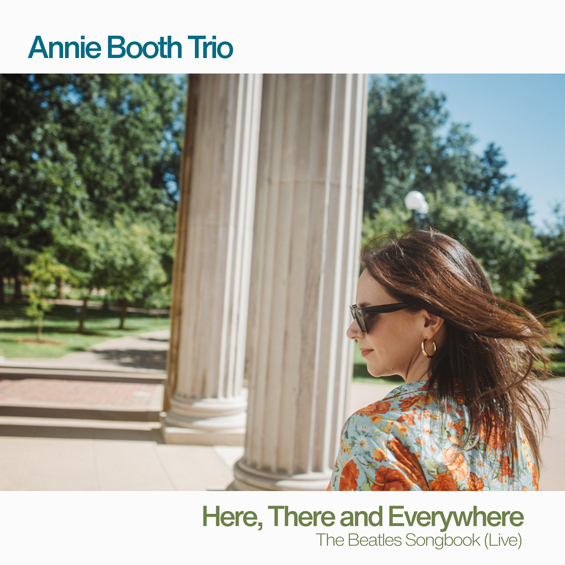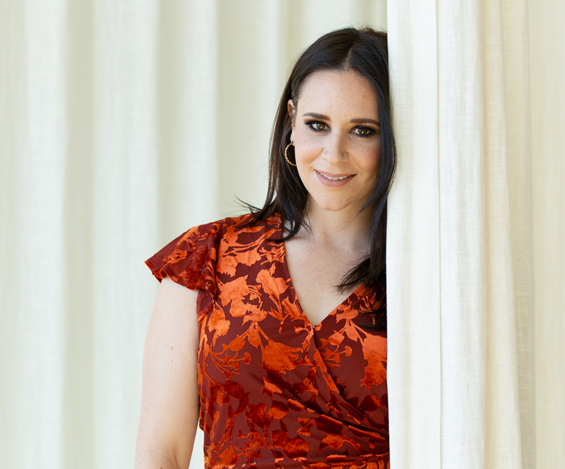
photo: Seth Beamer
FIVE QUESTIONS WITH ANNIE BOOTH
Visit any number of Denver, Colorado venues and you just might catch Annie Booth leading one of her many bands, be it her terrific piano trio (with bassist Patrick McDevitt and drummer Alejandro Castaño), the Annie Booth Sextet, or the eighteen-piece Annie Booth Big Band. This immensely talented and award-winning composer, conceptualist, arranger, and pianist boasts an ever-growing discography that's imaginative and unpredictable, extending as it does from 2023's Flowers of Evil, a heady blend of jazz, art song, and chamber music based on the poetry of Charles Baudelaire, and 2022's sextet recording Alpenglow to a 2018 set featuring her trio with vocalist Max Wellman on a collection of American songbook standards.
A graduate of the Thompson Jazz Studies Program at the University of Colorado-Boulder, Booth's also a highly regarded jazz educator who's currently on faculty at the University of Denver's Lamont School of Music and has appeared as a guest artist-educator/conductor at a number of institutions and worked for many years with students in the Colorado Conservatory for the Jazz Arts (CCJA). Our recent talk with Booth wasn't prompted by any of those worthy endeavours, however, but by the release of her new trio album, Here, There and Everywhere: The Beatles Songbook (Live) (reviewed here). While the group's material has been covered exhaustively, Booth, McDevitt, and Castaño reinvigorate eleven of the Fab Four's songs with fresh interpretations and inspired performances. Recorded before an enthusiastic Denver audience, the album ranges from audacious reimaginings of “Something” and “Come Together” to lyrical renderings of the title song and “Let It Be.” Booth elaborated on the project and its genesis when textura spoke with her recently about the new album and other related matters.
1. To begin, what prompted the idea of doing a Beatles songbook recording and how difficult was it to whittle such an incredible songbook down to the eleven songs you chose? Relatedly, I love the fact that you included some less familiar cuts, such as “Mother Nature's Son,” “Hey Bulldog,” and “Because.” Did you consciously decide to offset well-known songs like “Let it Be” and “Here Comes the Sun” to create a more interesting portrait or were these simply favourites of yours?
(AB) I've been a Beatles fan since I was a kid, and a few years ago I had the chance to put together a series at Nocturne Jazz Club in Denver featuring music from Abbey Road arranged for my jazz trio. That definitely sparked the idea for the album project, and I dove into arranging some of my favourites from other eras. It was incredibly hard to whittle down the selections! We actually recorded fourteen in the studio, but I ultimately cut it down to eleven. It wasn't necessarily a conscious choice to include some lesser-known ones, but it ended up creating a nice balance on the album.

2. I also love the fact that you re-imagined some songs with boldly imaginative arrangements. I'd not heard “Something” receive a blistering Latin makeover until your trio treatment and neither had I heard “Come Together” recast as a dub-reggae tune (the latter arrangement by bassist Patrick McDevitt) and “Because” as a sultry, tango-like samba. How did you come to decide on the treatments you gave to these and other songs?
(AB) Groove and meter were definitely the biggest musical elements I played around with in arranging these songs. The songbook features so many fantastic, iconic melodies as well as interesting, intuitive harmonic progressions and forms that I really didn't want to tweak too much of those elements. I add or substitute some harmony here and there and often add additional chord progressions to facilitate improvisation, but I'm mostly sticking to what Lennon, McCartney, and Harrison wrote. So, I found that groove was a fun place to reimagine these songs!
3. Your playing in the trio with bassist Patrick McDevitt and drummer Alejandro Castaño shows that the three of you have achieved a remarkable level of telepathy. Could you say a few words about the musical connection you have with them as well as how the trio came together?
(AB) Absolutely. It's beyond words to describe how special it's been to grow up alongside Patrick and Alejandro. We met as teenagers in the Denver area through a non-profit organization called Colorado Conservatory for the Jazz Arts (CCJA), which helps connect like-minded youth who are interested in playing jazz with one another and with mentors in the area. A few years later, as college students, we started playing together pretty often, just jamming at first and trying to improve our craft individually and as a group. That was fifteen years ago, and we've been a band ever since. They're some of my best friends in the world, and we've done so much growing up and experienced so much life change alongside one another. I feel so blessed for that. And I know our deep friendship and the thousands of hours of playing time together comes through in the music we get to share with audiences.

photo: Annie Booth
4. Another thing I love is your piano-playing approach, which honours the melodic essence of a song but also liberally departs from it in your personal embellishments. At each moment as you're playing, the essence of the composition remains present as a foundation. Stated otherwise, you seem to intuitively maintain a superb balance between adhering to the compositional material and straying from it in your personal expression. Is that approach something you consciously work out or is it something that at this stage happens naturally? At what stage in your development did you begin to feel in such command of your playing that you could simply execute and do so with authority?
(AB) Wow, what a thoughtful comment! Thank you. I think on some level, I try to always honour the composition that I'm playing. I use that as a road map, as a guide in my interpretation and improvisation. But of course, I think an intuitive way of doing that has developed over time. It happens naturally. I think I'm still (and will always be) striving to play what I hear. For me it's the ultimate mission of my musicianship, to draw out—with technique, with confidence, with experience—the honest sounds I'm hearing in my mind's ear. I can remember a specific point maybe around age twenty-four when I released my first album Wanderlust that I started to feel my technique catching up with what I was hearing, but the neat thing is that it's an ongoing, lifelong journey.
5. In one interview, you cited Brad Mehldau as an influence. What is it about his playing that influenced you?
(AB) Like so many pianist-composers of my generation, Brad Mehldau is a huge influence, and I'm a huge fan. I first found his music as a teenager probably sometime around 2005, about when I started to dig into playing jazz, and it was totally inspiring and mesmerizing to me. I'd listen (on my iPod!) and truly have no clue what he or his trio were doing, but I wanted to listen more and learn more to find out. Of course, as I kept digging into the music I went back into time to listen to lots and lots of folks who came before him on the piano and beyond, filling in the gaps in my jazz history, but I never discount that immediate connection I felt to his music. I've seen him live a number of times, and it's always sublime.

photo: Kelly Maxwell
Bonus question: In featuring recordings by different ensemble configurations and in shifting between albums of originals and others of covers, your discography is nothing if not eclectic. That's another way of saying that it's impossible to predict what will follow Here, There and Everywhere except that (unless I'm mistaken) it likely won't be another trio album. Do you have any inkling as to what kind of album the next one will be?
(AB) I have a couple of ideas floating around in my brain for projects that I'd love to execute in the near future. I'll definitely do a solo piano album soon and probably record it on my piano at home. I became a mother this year and have been writing little piano songs for my daughter, Sylvie. I'd love to make them into an album—a soft, mellow, close-mic'ed sort of vibe. The other project I see on the horizon is a big band album. I've been writing so much big band music over the past few years, and I started up my own big band in 2019. Because it'll be a huge endeavor, I know that project will take some crowd-funding and extra support, but my goal is to make that happen in the next year or two.
website: ANNIE BOOTH
August 2024![]()